Enshrined: Li Na, Mary Pierce, Yevgeny Kafelnikov enter Hall of Fame
By Steve Flink Jul 23, 2019Doubles Take: Salisbury and Skupski take San Diego's inaugural ATP event
By Van Sias Oct 05, 2021Madrid Open Betting Preview: Mariano Navone vs. Ben Shelton
By Zachary Cohen Apr 25, 2025Elena Rybakina vs. Bianca Andreescu: Where to Watch, Madrid Open Betting Odds
By TENNIS.com Apr 25, 2025Holger Rune vs. Flavio Cobolli: Where to Watch, Madrid Open Betting Odds
By TENNIS.com Apr 25, 2025Emma Raducanu vs. Marta Kostyuk: Where to Watch, Madrid Open Betting Odds
By TENNIS.com Apr 25, 2025Coco Gauff joins Iga Swiatek in rallying to win Madrid opener
By Associated Press Apr 24, 2025Illness forces Karolina Muchova to withdraw from Mutua Madrid Open
By TENNIS.com Apr 24, 2025Andre Agassi to make pro pickleball debut with Anna Leigh Waters at US Open Pickleball Championships
By Liya Davidov Apr 24, 2025Jelena Ostapenko won't face Iga Swiatek in Madrid after falling to Anastasija Sevastova
By TENNIS.com Apr 24, 2025Enshrined: Li Na, Mary Pierce, Yevgeny Kafelnikov enter Hall of Fame
The decorated trio, who each won two Grand Slams, was enshrined at the 2019 ceremony on Saturday.
Published Jul 23, 2019
Advertising
Never has the diversity of the International Tennis Hall of Fame been showcased more strikingly than this year on the hallowed grounds in Newport, Rhode Island. Three new members—Li Na of China, Yevgeny Kafelnikov of Russia and Mary Pierce of France—were deservedly enshrined over the past weekend. These champions were similarly accomplished in one respect—they all were victorious at two majors in singles. Moreover, each member of the trio ruled at the same two Grand Slam Championships in singles, taking both the French and Australian Open titles across their much heralded careers.
This time around, the festivities took place as usual on semifinal Saturday during the Hall of Fame Open, an ATP 250 event. But the timing of the inductions was different. Rather than commencing at noon under a sweltering sun before the start of the matches, the ceremony was slated for 6 p.m., contingent upon the conclusion of the tennis. But both penultimate round contests were settled in three sets, delaying the proceedings for about 90 minutes. The evening air was indeed cooler, but the light in the sky was receding.
Nonetheless, the honorees were exhilarated. The first to be enshrined was the charismatic Pierce, who was fittingly introduced by her former coach, longtime friend and mentor Nick Bollettieri—a member of the class of 2014. Bollettieri spoke poignantly about his former protege, conveying a youthfulness and spirit belying his chronological age of 88.
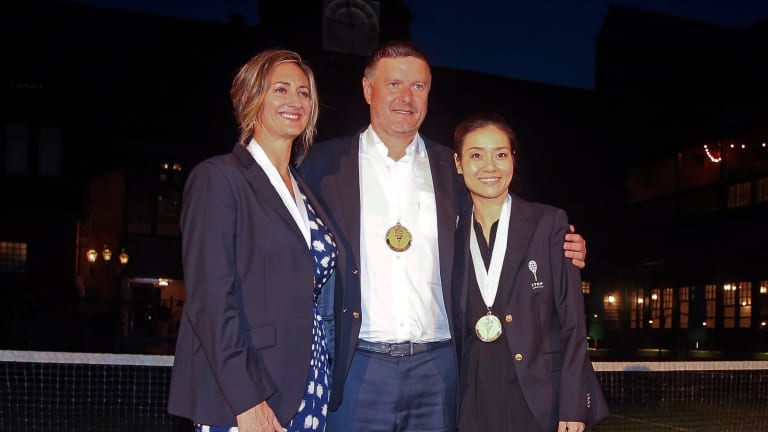
Enshrined: Li Na, Mary Pierce, Yevgeny Kafelnikov enter Hall of Fame
© Copyright 2019 The Associated Press. All rights reserved
Advertising
Li Na, Yevgeny Kafelnikov and Mary Pierce each won two major titles in Australia and Paris. (AP)
He said, “No matter how much time I have been given to find a way to tell you about my Mary, it would be very difficult in the short amount of time I have today. Mary, you see, is much more than a great tennis champion. Her credentials speak loud and clear, winning the Australian Open and the French Open, finals of the U.S. Open, and helping France to win two Fed Cups. The first time I saw Mary at the IMG Academy with her father when she was 13 years old, I had to put on my Maui Jim sunglasses. You know why? Are you kidding me. Wow! She stood on top of the baseline, baby, and whacked every single ball with all her might.”
Concluding his remarks, Bollettieri said, “Mary Pierce, you will always be part of my life. Never change giving your heart and soul to make the world a better place, helping people achieve their goals as you achieved your goals.”
Pierce walked up and greeted all of the assembled Hall of Famers who were seated above the speaking platform, including your agent. She mused about all facets of her life and career, and generously lauded a wide range of people who had played crucial roles in enabling her to reach the summit of her sport.
She recalled something she had read at the end of her teens that has stayed with her ever since. “There’s a quote I read when I was about 18 or 19 years old. It said ‘The goal is only as worthy as the effort required to achieve it.’ I remember reading that at the beginning of my professional career and how much that really spoke to me because of how difficult things are and how much hard work and dedication it takes to achieve your goals and your dreams. And like Nick said, all of the blood, sweat and tears that it takes is worth it. I realized the great dreams that I had in tennis. I put them high. I thought to be able to achieve them, it’s going to take everything of me. Like Nick said, I didn’t hold back anything. I always felt that I gave 100% of myself, and that I can be very proud of that.”
Advertising
The speech was expansive, covering the spectrum of her life, her estrangement and later rekindled relationship with an obstreperous father Jim Pierce, her move to her mother’s homeland of France at 13 and how she intensified her tennis training once that happened. She addressed the importance of religion in her life, the contribution made by a multitude of friends, the joy she took in capturing the French Open singles and doubles titles in 2000, and the satisfaction of returning to the final of Roland Garros at the age of 30 in 2005, when she was also the runner-up at the US Open.
Near the end of her remarks, Pierce said, “I always played with all of my heart. I always did my best. I always learned from my mistakes. I always wanted to be better. The competition was with myself, not anybody else.”
By the time Pierce concluded her genuinely appreciative speech, the sky was darkening significantly. Regrettably, despite her honorable intentions and the unmistakable effort and thoughtfulness that had characterized her words, she had remained at the podium for much too long, speaking for nearly thirty minutes. But the program from that point moved along swiftly.
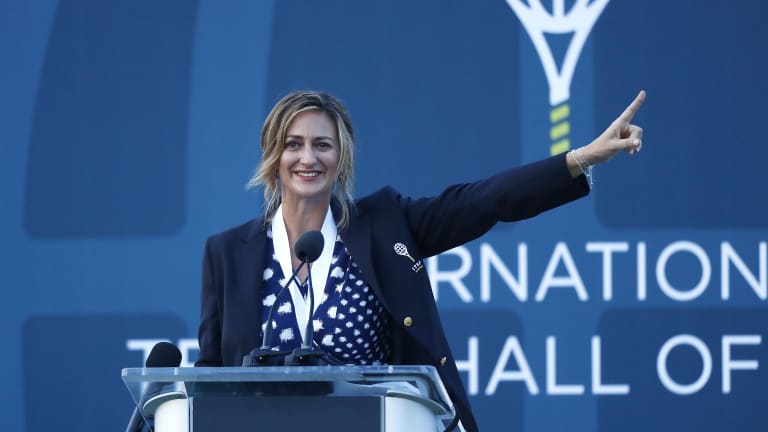
Enshrined: Li Na, Mary Pierce, Yevgeny Kafelnikov enter Hall of Fame
© All Rights Reserved 2019
Advertising
Pierce was humbled by the Hall of Fame honor. (Getty Images)
Larry Stefanki—a man who has coached John McEnroe, Marcelo Rios, Andy Roddick and Tim Henman, among others—was up next to introduce another of his prominent charges: Yevgeny Kafelnikov. Despite a condensed speech, Stefanki did a remarkable job of portraying Kafelnikov’s multi-dimensional record, the best of all the 2019 inductees.
Stefanki amusingly said, “A lot of people ask me this question: how does a Russian end up being coached by an American? Well, I’ll tell you. I’ve coached many players from various places around the globe. I’ve found that athletes are athletes regardless of where they come from. Yevgeny and I just connected. We had a very similar thought process about competing at the very top level. Yevgeny learned the game of tennis old school style. He was definitely a workhorse. Early on he learned the importance of fundamentals, footwork, repetition, fitness and a work ethic that would bring him great success on tour.”
Citing the extraordinary number of achievements on the ledger of Kafelnikov, Stefanki mentioned the 26 singles titles and two majors won by the Russian, the 27 doubles titles including four Grand Slam triumphs, and the fact that Kafelnikov was the last man to sweep singles and doubles titles at a Grand Slam event when he was victorious at Roland Garros in 1996. He saluted Kafelnikov for becoming the first Russian man (in 1999) to reside at No. 1 in the world, and for garnering a gold medal at the Olympic Games in 2000. And he informed many erudite observers who were not aware that Kafelnikov won the Russian National Championship in golf eight years ago and also established himself as the No. 1 ranked golfer in his country.
But Stefanki wanted to make certain that everyone knew that Kafelnikov was more than the sum of his achievements. He said, “Yevgeny is a very generous individual. He donated his 2001, and fifth Moscow Open victory in a row, to the Siberian air disaster on the Black Sea. He started a pediatric hospital in his hometown where the kids could not afford surgeries. He also started an academy in his hometown outside Sochi, which started his playing career.”
Advertising
For his part, Kafelnikov was dignified and understated, fully recognizing the magnitude of the honor, as prideful as could be about becoming a Hall of Famer. He lauded his mother and father for their incomparable contribution to his life. As he said, “I felt nothing but love, warmth and care, Mom and Dad. I know you are watching. When I come back home we will celebrate this wonderful day.”
He then singled out three people who had been instrumental in his success: Valery Shishkin, the late Anatoly Lepeshin and Stefanki. Shishkin taught Kafelnikov the fundamentals of the sport. When Yevgeny was nine and trying to determine if he was better off with a one or a two-handed backhand, Shishkin asserted, “Yevgeny, I don’t know what you’re thinking, but your two-handed backhand will make you win so many titles.”
Kafelnikov listened, and the two-hander—especially his down the line shot off that side—was the chief anchor of his game. He explained the importance of Lepeshin by proclaiming, “He basically was like a second father to me, who told me how to compete, how to behave on the court and how to be very professional.”
Putting Stefanki’s influence into perspective, Kafelnikov said, “Professionals go through ups and downs in their careers. In the middle of [1998], I felt like I was struggling with my motivation and desire. My agent called me up and said, ‘Look, Larry is around. He’s got good reputation.’ I was on my own and basically had no coach. I said, ‘Yeah, let’s give it a shot.’”
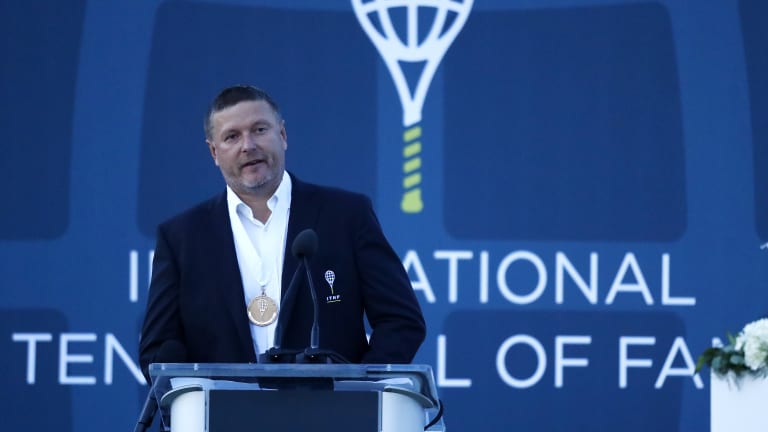
Enshrined: Li Na, Mary Pierce, Yevgeny Kafelnikov enter Hall of Fame
© All Rights Reserved 2019
Advertising
Kafelnikov is the last man to win the singles and doubles titles at the same Slam. (Getty Images)
The well suited duo had three excellent seasons together. In 1999, Kafelnikov won the Australian Open and three months later moved to No. 1 in the world.
“I value our relationship very much to this day,” said Kafelnikov. “We’ve been friends for a number of years. Hopefully we’ll stay like that forever. Thank you, Larry.”
Following a gracious Kafelnikov behind the microphone in the fading light was Max Eisenbud, both an agent and close friend to Li Na. His speech was magnificent.
“Li Na,” he said, “I am humbled and grateful to have the honor to induct you into the International Tennis Hall of Fame. Most of the last ten years have been a privilege to work with you, to witness you becoming an incredible player, woman, wife, mother, entrepreneur, author, film producer, chef. The list goes on and on. [You are] an inspiration for millions of people around the world.
"We all know to make it into the Hall of Fame you have to be an accomplished player and an amazing champion. What I admire and think is most impressive about you is that you have been a true pioneer, not just for tennis, not just for women, but for all of China.”
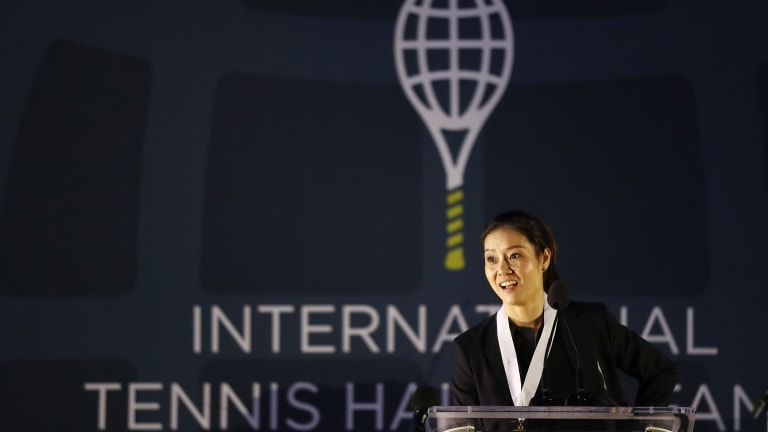
Enshrined: Li Na, Mary Pierce, Yevgeny Kafelnikov enter Hall of Fame
© All Rights Reserved 2019
Advertising
A trailblazer, Li became the first Asian player to win a major. (Getty Images)
Eisenbud elaborated on what made Li Na’s improbable journey so commendable. He alluded to Lebron James being inspired by Michael Jordan, Jordan having Larry Bird as someone to admire, and Roger Federer looking up to Boris Becker and Stefan Edberg.
“Li Na had nobody, “ said Eisenbud. “There was no roadmap in China for becoming a great champion in a western-dominated sport. There were no successful athletes in China in individual sports before Li Na. There was no Chinese Jordan, Edberg or Federer. While the Chinese restrictive sports machine taught Li Na incredible worth ethic and made her mentally strong, she couldn’t get the proper tennis training. She wasn’t allowed to have a manager or an agent to guide her on the path to success.
"She had to give up most of her earnings and couldn’t afford proper coaching. She was part of a system that [had] never produced an individual female tennis player who ever broke into the top 70. And yet, somehow this rose sprouted through the asphalt and overcame every hurdle in front of her. Nothing was going to stop this amazing woman from becoming a champion.”
Advertising
And so the first Asian player to win a Grand Slam singles title concluded the induction ceremony as stylishly as she played the game not long ago. Her speech was the shortest of the evening but it reflected her quiet dignity, fine sense of humor and self-effacing nature.
“Tennis has taken me around the world, exploring different countries. Also, because of this great sport, I have more self-control and I have become better organized. I think for this I can benefit lifelong and, more importantly, not just on the tennis court. It has been five years since my retirement. In the past five years I enjoy better work and life and most importantly I have two children. Also, the same husband! I will do all I can to inspire and help more young and upcoming players and hope they can enjoy this amazing sport.”
On that high note, the ceremony ended. And as Mary Pierce, Yevgeny Kafelnikov and Li Na walked away from the arena with an honor they will cherish for the rest of their lives, no one could say they were not worthy recipients.
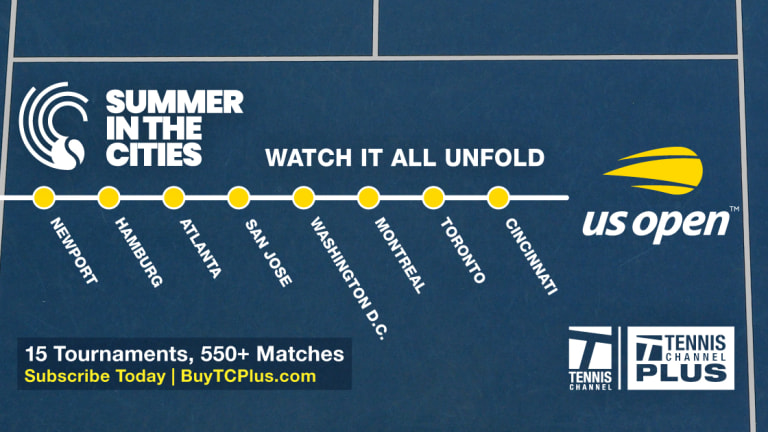
Enshrined: Li Na, Mary Pierce, Yevgeny Kafelnikov enter Hall of Fame